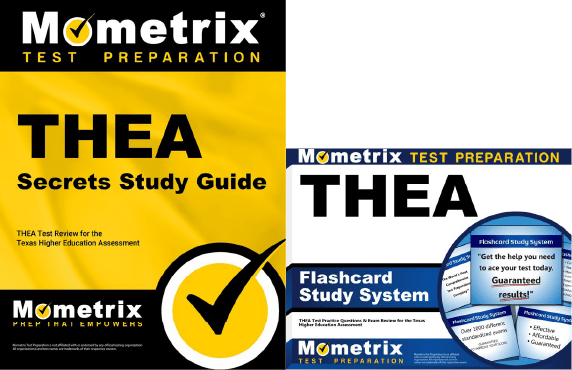If you need help studying for the THEA test or just want some more information about what the test is like, you’ve come to the right place.
Click below to take a free THEA practice test!
What’s on the THEA Test?
There are 130 multiple-choice questions and one essay on the exam, and the time limit is 4 hours. There aren’t any scheduled breaks, but you’re free to take restroom breaks as needed.
Let’s take a closer look at each section:
Reading
40 questions
These are the specific skills you’ll be tested on:
- Determining the meaning of words and phrases
- Understanding the main idea and supporting details
- Identifying the author’s purpose and intended meaning
- Identifying the author’s point of view
- Analyzing the relationship among ideas
- Evaluating the passage using critical reasoning
- Organizing and summarizing information
- Interpreting information presented in charts, graphs, or tables
Mathematics
50 questions
These are the specific skills you’ll be tested on:
Fundamental Mathematics
- Integers
- Fractions
- Decimals
- Units of measurement
- Data interpretation and analysis
Algebra
- Graphing numbers and number relationships
- Solving one- and two-variable equations
- Operations with algebraic expressions
- Operations with functional notation
- Quadratic equations
Geometry
- Two- and three-dimensional figures
- The Pythagorean theorem
- Similarity and congruence
- Parallelism and perpendicularity
Problem-Solving
- Drawing conclusions
- Inductive and deductive reasoning
- Solving applied problems using various math skills
Writing
40 questions | 1 essay
For the essay, you’ll be asked to write 300-600 words on a given topic, and you’ll be tested on the following characteristics:
- Appropriateness
- Unity and focus
- Development
- Organization
- Sentence structure
- Usage
- Mechanical conventions
For the multiple-choice questions, these are the skills you’ll be tested on:
- Recognizing purpose and audience
- Recognizing unity and focus
- Recognizing development
- Recognizing effective organization
- Recognizing effective sentences
- Recognizing edited American English usage
How to Register
To get started, you’ll need to contact the school where you plan to take the test to ensure you’re able to take it there. Then, you’ll need to set up a THEA IBT account and register for the test.
When you register, you’ll need to pay the $29 testing fee.
Test Scores
The test is scored using a scaled scoring method. Here’s how it works:
For every question you answer correctly, you get one point added to your raw score. At the end of the test, your final raw score will be converted to a scaled score. This scaled score will range somewhere between 100 and 300.
For the Writing section, you’ll need a scaled score of at least 220 to pass. Your essay is scored from 1 to 4 and integrated into your scaled score.
The reason your raw score is converted to a scaled score is because everyone who takes the test is given a slightly different set of questions. Since everyone has a different arrangement of questions, and because some questions are harder than others, converting your raw score to a scaled score ensures a more even playing field.
Retaking the Exam
If you didn’t get a passing score on your first try, that’s okay! You can retake the test after a 14-day waiting period.
Keep in mind that you will have to pay the full testing fee every time you retake the test.
FAQs
How many questions are on the THEA test?
The test contains 130 questions.
What is the time limit for the THEA test?
The test is timed at 4 hours.
What is the passing score for the THEA test?
You’ll need a scaled score of at least 230 on the Reading and Mathematics sections and at least 220 on the Writing section.
How much does the THEA test cost?
The testing fee is $29.
Is the THEA test hard?
It’s not considered to be a very difficult test.
Self-Assessment Modules
One of the most important parts of preparing for a test is determining which topics you need to brush up on as you study.
To get started with a self-assessment of your knowledge, click on one of the modules below!



 THEA Test Study Guide
THEA Test Study Guide THEA Test Flashcards
THEA Test Flashcards